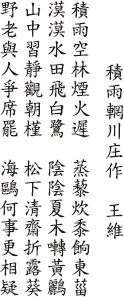201

The retreat Wang Wei (701–761) bought on the Wang River was sixty kilometers southeast of Ch’ang-an and once belonged to the poet Sung Chihwen. Although Wang rose to the post of deputy prime minister, he was a lifelong Buddhist and a vegetarian, and toward the end of his life he spent more time meditating at his retreat and hiking around the mountains than working in the capital. Hibiscus flowers only last a day, or two at most, and mallow leaves are best picked after the dew dries. Hence, Wang Wei is too hungry to wait. In Chuangtzu: 27 the arrogant Yang-tzu Yu returns to his inn after receiving instruction from Lao-tzu. But where he was once waited on hand and foot, he now has to fight for a place for his mat. “Seats” here also refer to positions of authority, concerning which the poet no longer has any interest. In Liehtzu: 2.11 the author recounts how seagulls flock around a man, until he conceives of a plan to catch them.
Written at My Wang River Retreat after a Steady Rain
WANG WEI
Steady rain deserted woods and finally kitchen smoke
steamed greens and millet for those in the eastside fields
snowy egrets fly above a sea of flooded fields
golden orioles sing in the shadows of summer trees
sitting in the mountains I regard the day’s hibiscus
and cut dewy mallow leaves for a meal below the pines
living in the country I’ve stopped fighting over seats
why then do the seagulls still suspect me